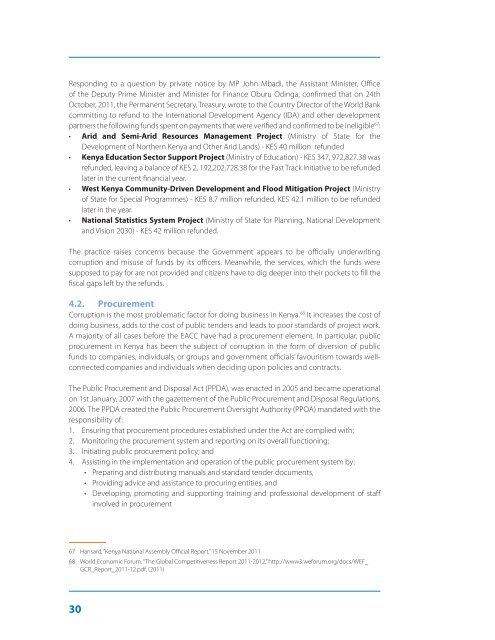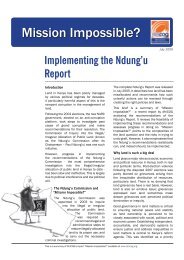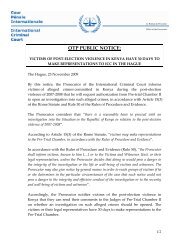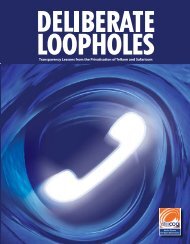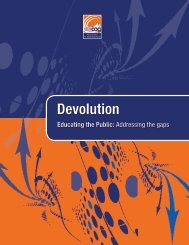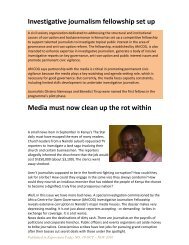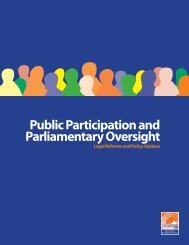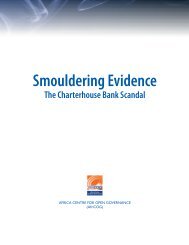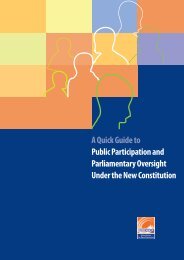Untitled - Africa Centre for Open Governance
Untitled - Africa Centre for Open Governance
Untitled - Africa Centre for Open Governance
Create successful ePaper yourself
Turn your PDF publications into a flip-book with our unique Google optimized e-Paper software.
Responding to a question by private notice by MP John Mbadi, the Assistant Minister, Office<br />
of the Deputy Prime Minister and Minister <strong>for</strong> Finance Oburu Odinga, confirmed that on 24th<br />
October, 2011, the Permanent Secretary, Treasury, wrote to the Country Director of the World Bank<br />
committing to refund to the International Development Agency (IDA) and other development<br />
partners the following funds spent on payments that were verified and confirmed to be ineligible 67 :<br />
• Arid and Semi-Arid Resources Management Project (Ministry of State <strong>for</strong> the<br />
Development of Northern Kenya and Other Arid Lands) - KES 40 million refunded<br />
• Kenya Education Sector Support Project (Ministry of Education) - KES 347, 972,827.38 was<br />
refunded, leaving a balance of KES 2, 192,202,728.38 <strong>for</strong> the Fast Track Initiative to be refunded<br />
later in the current financial year.<br />
• West Kenya Community-Driven Development and Flood Mitigation Project (Ministry<br />
of State <strong>for</strong> Special Programmes) - KES 8.7 million refunded. KES 42.1 million to be refunded<br />
later in the year.<br />
• National Statistics System Project (Ministry of State <strong>for</strong> Planning, National Development<br />
and Vision 2030) - KES 42 million refunded.<br />
The practice raises concerns because the Government appears to be officially underwriting<br />
corruption and misuse of funds by its officers. Meanwhile, the services, which the funds were<br />
supposed to pay <strong>for</strong> are not provided and citizens have to dig deeper into their pockets to fill the<br />
fiscal gaps left by the refunds.<br />
4.2. Procurement<br />
Corruption is the most problematic factor <strong>for</strong> doing business in Kenya. 68 It increases the cost of<br />
doing business, adds to the cost of public tenders and leads to poor standards of project work.<br />
A majority of all cases be<strong>for</strong>e the EACC have had a procurement element. In particular, public<br />
procurement in Kenya has been the subject of corruption in the <strong>for</strong>m of diversion of public<br />
funds to companies, individuals, or groups and government officials’ favouritism towards wellconnected<br />
companies and individuals when deciding upon policies and contracts.<br />
The Public Procurement and Disposal Act (PPDA), was enacted in 2005 and became operational<br />
on 1st January, 2007 with the gazettement of the Public Procurement and Disposal Regulations,<br />
2006. The PPDA created the Public Procurement Oversight Authority (PPOA) mandated with the<br />
responsibility of:<br />
1. Ensuring that procurement procedures established under the Act are complied with;<br />
2. Monitoring the procurement system and reporting on its overall functioning;<br />
3. Initiating public procurement policy; and<br />
4. Assisting in the implementation and operation of the public procurement system by:<br />
• Preparing and distributing manuals and standard tender documents,<br />
• Providing advice and assistance to procuring entities, and<br />
• Developing, promoting and supporting training and professional development of staff<br />
involved in procurement<br />
67 Hansard, “Kenya National Assembly Official Report,” 15 November 2011<br />
68 World Economic Forum, “The Global Competitiveness Report 2011-2012,” http://www3.we<strong>for</strong>um.org/docs/WEF_<br />
GCR_Report_2011-12.pdf, (2011)<br />
30


